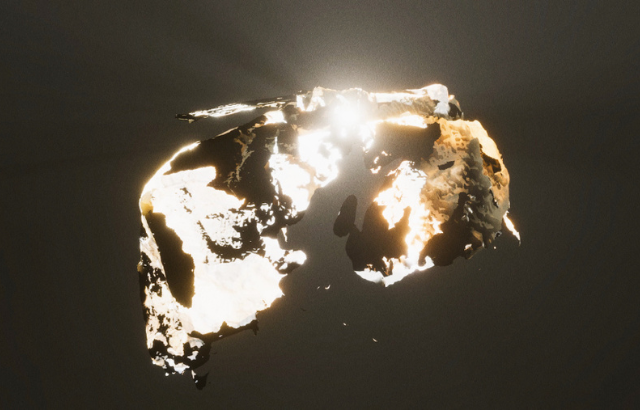
Michael Salu, Diabolical Architectures of Colonialism, film still. Single-Channel video. 42 minutes
Formed alongside Casper Laing Ebbensgaard and Michael Salu, this group is set to reshape our understanding of colonial legacies through critical cartography and creative practice.
Planetary Portals is a research group that delves into imperial archives to produce critical cartographies, interrogating the colonial practices of "emergence and extraction." Their work illuminates how geo-social inequities, rooted in colonialism, continue to be reproduced and maintained in the present day. The group employs 'the portal' as a method to trace the persistent reappearance of colonial histories and to explore ways of reassembling colonial geographies that nurture an ethics of epistemic repair and hold potential for liberation.
This innovative research has attracted considerable attention, with Planetary Portals recently being selected for a prestigious digital commission by The Photographers' Gallery. Supported by the Paul Mellon Centre for Studies in British Art, the commission will culminate in a 2025 exhibition, both online and at the gallery, showcasing the group's critical and creative engagement with the colonial legacies of extraction that are retooled in AI and digital infrastructures. Informed by Dr Holden's work on African AI the project explores how environmental narratives and geographic imaginaries that shape material lives can be intervened in through creative modes of doing decolonial research.
The project's conceptual depth and critical engagement have been widely recognised. Winnie Soon, an artist and researcher on the selection panel, described Planetary Portals as "a conceptually potent and critically incisive project exploring colonialism's enduring impact. Its artistic approach and critical depth make it a standout work that powerfully illuminates the shadows of extractivism."
Ioanna Zouli, editor of Unthinking Photography and another panel member, praised the project's ability to address the systemic silencing within colonial archives, noting, "Planetary Portals distinguished itself with its critical perspective on sustained colonial afterlives. It is a collective research project that considers the systemic silencing of voices through colonial archives as well as ways of reclaiming and re-narrating one's cultural history."
An integral part of this research involves collaboration with Environmental Humanities South (EHS) at the University of Cape Town. Supported by a Queen Mary University of London impact grant, this partnership includes a joint reading group on African post-colonial and Black ecologies, and an ongoing research project focused on the environmental legacies of colonialism. The collaboration between Queen Mary University of London and EHS creates a portal between the historic Rhodes estate in Dalston (and its role in financing the white supremacist Cecil Rhodes in the development of diamond fields) and the impacts of his extraction on environmental histories in South Africa.
As the world increasingly confronts the consequences of the Anthropocene—a crisis deeply connected to colonial histories of exploitation and dispossession—Planetary Portals offers a vital and reflective perspective on how these historical forces continue to shape our present. Through their work, Dr Holden, Professor Yusoff, and their colleagues are not only advancing academic discourse but also contributing to a broader understanding and rethinking of global histories and the enduring impacts of colonialism.






